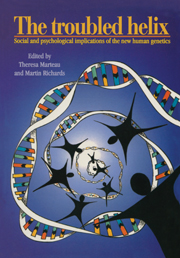Book contents
- Frontmatter
- Contents
- List of contributors
- Preface
- Preface to the paperback edition
- Acknowledgements
- Part I Personal stories
- Part II Clinical context
- 2 The new genetics: a user's guide
- 3 Decision-making in the context of genetic risk
- 4 Genetic counselling: some issues of theory and practice
- 5 Evaluating carrier testing: objectives and outcomes
- 6 Psychosocial aspects of prenatal screening and diagnosis
- 7 The genetic testing of children: a clinical perspective
- 8 Predictive genetic testing in children: paternalism or empiricism?
- Part III Social context
- Index
4 - Genetic counselling: some issues of theory and practice
from Part II - Clinical context
Published online by Cambridge University Press: 01 June 2011
- Frontmatter
- Contents
- List of contributors
- Preface
- Preface to the paperback edition
- Acknowledgements
- Part I Personal stories
- Part II Clinical context
- 2 The new genetics: a user's guide
- 3 Decision-making in the context of genetic risk
- 4 Genetic counselling: some issues of theory and practice
- 5 Evaluating carrier testing: objectives and outcomes
- 6 Psychosocial aspects of prenatal screening and diagnosis
- 7 The genetic testing of children: a clinical perspective
- 8 Predictive genetic testing in children: paternalism or empiricism?
- Part III Social context
- Index
Summary
Introduction
With the rapid rate of discoveries in human genetics and their increasing clinical application, the demand for genetic counselling is increasing. We know little about what makes for effective or efficient genetic counselling. This chapter will focus upon the methodological issues that need to be considered if we are to further our understanding of the effective ingredients of genetic counselling. In doing so, we will necessarily touch upon decision-making in the counselling context. This is, however, dealt with in more detail in Chapter 3.
The attempt to evaluate genetic counselling requires a definition of its aims. Broadly speaking, genetic counselling is a communication process aimed at helping people with problems associated with genetic disorders or the risk of these in their family. Its most uncontroversial goal is to improve the quality of life of the families that seek such help (Twiss, 1979).
The central issue in genetic counselling has been described as ‘the provision of “objective” information from the counsellor and its interpretation by a patient’ (Shiloh and Saxe, 1989). Other definitions have included decision-making. One such example is: ‘the essence of genetic counselling is the counsellor's ability to transmit genetic information about an inherited disorder of concern to the counsellee(s) so that it will be incorporated into decision making’ (Falek, 1984). A widely quoted, and comprehensive, definition of genetic counselling was provided by Fraser (1974, p. 637).
- Type
- Chapter
- Information
- The Troubled HelixSocial and Psychological Implications of the New Human Genetics, pp. 104 - 122Publisher: Cambridge University PressPrint publication year: 1996
- 28
- Cited by



